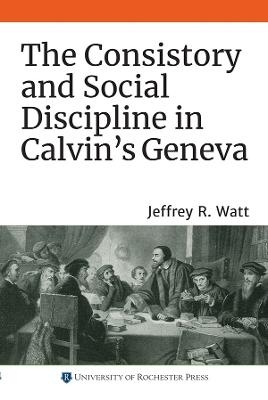
The Consistory and Social Discipline in Calvin's Geneva
Seiten
2020
University of Rochester Press (Verlag)
978-1-64825-004-0 (ISBN)
University of Rochester Press (Verlag)
978-1-64825-004-0 (ISBN)
Examines the most successful institution of social discipline in Reformation Europe: the Consistory of Geneva during the time of John Calvin
Created by John Calvin, the Consistory of Geneva was a quasi-tribunal entrusted with enforcing Reformed morality. Comprised of pastors and elders, this body met weekly and summoned people for a wide range of "sinful" behavior, such as drunkenness, dancing, blasphemy, or simply quarrels, and was a far more intrusive institution than the Catholic Inquisition. Among the thousands summoned during Calvin's ministry were a pair of women who were allegedly prophets, boys who skipped catechism to practice martial arts, and a good number of people begging for forgiveness for having renounced Protestantism out of fear of death.
This superbly researched book, reflecting author Jeffrey Watt's career-long involvement in the ongoing project of transcribing, editing, and publishing the Consistory records, is the first comprehensive examination of this morals court and provides a window into the reception of the Reformation in the so-called Protestant Rome. Watt examines the role of the Consistory in upholding patriarchy, showing that while Genevan authorities did not have a double standard in prosecuting illicit sexuality, the Consistory exhorted women to obey even violently abusive husbands. He finds also that Calvin and his colleagues vigorously promoted a strong work ethic by censuring people, mostly men, for laziness, and showed a surprising degree of skepticism toward accusations of witchcraft. Finally, Watt demonstrates convincingly that, while the Consistory encountered some resistance, Genevans by and large shared the ideals it promoted and that it enjoyed considerable success in fostering discipline in Genevan society.
This book is openly available in digital formats, under Creative Commons license CC BY-NC, thanks to a generous grant from the Andrew W. Mellon Foundation.
Created by John Calvin, the Consistory of Geneva was a quasi-tribunal entrusted with enforcing Reformed morality. Comprised of pastors and elders, this body met weekly and summoned people for a wide range of "sinful" behavior, such as drunkenness, dancing, blasphemy, or simply quarrels, and was a far more intrusive institution than the Catholic Inquisition. Among the thousands summoned during Calvin's ministry were a pair of women who were allegedly prophets, boys who skipped catechism to practice martial arts, and a good number of people begging for forgiveness for having renounced Protestantism out of fear of death.
This superbly researched book, reflecting author Jeffrey Watt's career-long involvement in the ongoing project of transcribing, editing, and publishing the Consistory records, is the first comprehensive examination of this morals court and provides a window into the reception of the Reformation in the so-called Protestant Rome. Watt examines the role of the Consistory in upholding patriarchy, showing that while Genevan authorities did not have a double standard in prosecuting illicit sexuality, the Consistory exhorted women to obey even violently abusive husbands. He finds also that Calvin and his colleagues vigorously promoted a strong work ethic by censuring people, mostly men, for laziness, and showed a surprising degree of skepticism toward accusations of witchcraft. Finally, Watt demonstrates convincingly that, while the Consistory encountered some resistance, Genevans by and large shared the ideals it promoted and that it enjoyed considerable success in fostering discipline in Genevan society.
This book is openly available in digital formats, under Creative Commons license CC BY-NC, thanks to a generous grant from the Andrew W. Mellon Foundation.
JEFFREY R. WATT is the Kelly Gene Cook Sr. Professor of History at the University of Mississippi.
Abbreviations and Illustrations
Acknowledgements
Introduction
1. The Consistory Encounters Resistance
2. The Push for Religious Uniformity
3. Educating and Disciplining the Young
4. Controlling Lust and Regulating Marriage
5. Superstitions, Magic, and Witchcraft
6. Promoting the Industrious and Sober Lifestyle
7. Conflicts, Reconciliation, and the Confession of Sins
Conclusion
Selected Bibliography
Notes
Index
| Erscheinungsdatum | 16.11.2020 |
|---|---|
| Reihe/Serie | Changing Perspectives on Early Modern Europe |
| Verlagsort | Rochester |
| Sprache | englisch |
| Maße | 152 x 229 mm |
| Themenwelt | Geisteswissenschaften ► Geschichte ► Regional- / Ländergeschichte |
| Geschichte ► Teilgebiete der Geschichte ► Kulturgeschichte | |
| Geschichte ► Teilgebiete der Geschichte ► Sozialgeschichte | |
| Geisteswissenschaften ► Religion / Theologie ► Christentum | |
| ISBN-10 | 1-64825-004-1 / 1648250041 |
| ISBN-13 | 978-1-64825-004-0 / 9781648250040 |
| Zustand | Neuware |
| Haben Sie eine Frage zum Produkt? |
Mehr entdecken
aus dem Bereich
aus dem Bereich
der stille Abschied vom bäuerlichen Leben in Deutschland
Buch | Hardcover (2023)
C.H.Beck (Verlag)
CHF 32,15
vom Mittelalter bis zur Gegenwart
Buch | Softcover (2024)
C.H.Beck (Verlag)
CHF 16,80


